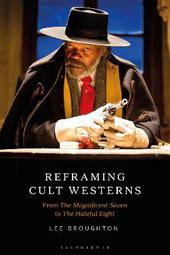
|
Reframing Cult Westerns: From The Magnificent Seven to The Hateful Eight
Paperback / softback
Main Details
| Title |
Reframing Cult Westerns: From The Magnificent Seven to The Hateful Eight
|
| Authors and Contributors |
Edited by Dr Lee Broughton
|
| Physical Properties |
| Format:Paperback / softback | | Pages:256 | | Dimensions(mm): Height 229,Width 152 |
|
| ISBN/Barcode |
9781501386893
|
| Classifications | Dewey:791.4365878 |
|---|
| Audience | | Tertiary Education (US: College) | |
|---|
| Illustrations |
4 bw illus
|
|
Publishing Details |
| Publisher |
Bloomsbury Publishing Plc
|
| Imprint |
Bloomsbury Academic USA
|
| Publication Date |
23 September 2021 |
| Publication Country |
United States
|
Description
Once one of the most popular film genres and a key player in the birth of early narrative cinema, the Western has experienced a rebirth in the era of post-classical filmmaking with a small but noteworthy selection of Westerns being produced long after the genre's 1950s heyday. Thanks to regular repertory cinema and television screenings, home video releases and critical reappraisals by cultural gatekeepers such as Quentin Tarantino, an ever-increasing number of these Westerns have become cult films. Be they star-laden, stylish, violent, bizarre or simply little heard-of obscurities, Reframing Cult Westerns offers a multitude of new critical insights into a truly eclectic selection of cult Western films. These twelve essays present a wide-ranging methodological scope, from industrial histories to ecocritical approaches, auteurist analysis to queer and other ideological angles. With a thorough analysis of the genre from international perspectives, Reframing Cult Westerns offers fresh insight on the Western as a global phenomenon.
Author Biography
Dr. Lee Broughton is a freelance writer, critic, film programmer and lecturer in film and cultural studies. He is the author of The Euro-Western: Reframing Gender, Race and the 'Other' in Film (2016) and the editor of Critical Perspectives on the Western: From A Fistful of Dollars to Django Unchained (2016). He has contributed chapters and articles to numerous edited collections and academic journals.
Reviews[An] exceptional look at what has become of the contemporary western. * CineSavant * Once the backbone of Hollywood production, the Western film has - since the 1960s - moved to the margins, often into the world of midnight movies and cults. Most studies of the Western tend to lose interest in the genre when it ceased to be mainstream - which is precisely where Reframing Cult Westerns begins. The various essays in the book, curated by Lee Broughton, examine films which set out to be cults, and films which didn't but which have turned into cults over time. They revisit classic Westerns through the prism of more recent generic developments. They treat the Western as a global text, including examples from Australia and Argentina, Mexico and Italy, Denmark and Scotland, East and West Germany. The result is not only a reframing of some cult Westerns, but a reframing of our understanding of the Western film. Maybe it hasn't headed for the last roundup after all... * Christopher Frayling, Professor Emeritus of Cultural History, Royal College of Art, UK and author of Once Upon a Time in Italy (2002) and Sergio Leone (2000) * Lee Broughton has compiled an exciting collection of essays that draws together a range of contemporary approaches to studying the cult Western. For anyone wanting to find out why the genre remains crucial for our understanding of the United States and its role in the world, and for anyone interested in making sense of the genre's place within a global cultural context, this is a must-have book. * John White, Senior Lecturer in Film and Media, Anglia Ruskin University, UK * An adventurous and illuminating collection, throwing light on many marginal, even eccentric films, and demonstrating that the Western still has many ways of exciting and intriguing us. * Edward Buscombe, editor of The BFI Companion to the Western (1988) * Seen through the lens of cult cinema, the Western, that most familiar of movie genres, takes on exciting and often unexpected new meanings. Whether providing fresh perspectives on familiar works or drawing our attention to understudied films and trends, these essays serve as a valuable reminder of the Western's vibrancy over the past half-century, and of the expressive possibilities it still offers filmmakers today. * Dr. Andrew Patrick Nelson, Associate Professor of Film Studies, University of Utah, USA *
|